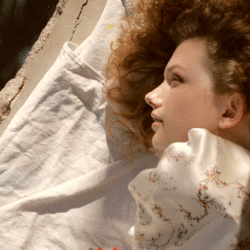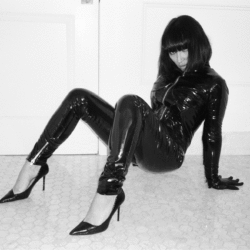When people ask Nyanda Donaldson what she does, she’s likely to respond, and without a hint of sarcasm, “What don’t I do?”
TALENT NYANDA DONALDSON CREATIVE DIRECTOR ELLA MCNANEY 1ST ASSISTANT CATHERINE FORSYTH PHOTOGRAPHER ANDREAS NEUMANN HAIR STYLIST EMILY ZEMPEL FOR EXCLUSIVE ARTISTS MAKE-UP ARTIST SARA DENMAN STYLING AND WARDROBE BY NYANDA PRODUCTION VENI MAGAZINE LOCATION JOSEPH GROSS GALLERY INTERVIEW BY CHRISTIAN CHENSVOLD



It’s not boastful either. Donaldson is a role model for anyone — man, woman or other — seeking to have it all and then pull off the miraculous act of balancing the whole thing. Her career is glamorous and exciting with plenty of travel and endless encounters with successful and creative people. She does this through two tandem careers: one as a design consultant/creative director, and the second as co-owner of the Joseph Gross Gallery with her life partner. On top of that, she’s raising three daughters, plus a foster child. And on top of that, she gets up every morning at five for meditation and exercise.
Oddly enough, because she loves her work and because it’s flexible, balancing it all is actually not that difficult, Donaldson says. “I have a great schedule,” she says firmly, “because I can make my own.” It wasn’t always so easy, however. With her home in the San Francisco Bay Area, for seven years the Joseph Gross Gallery was located in Manhattan’s art epicenter of Chelsea. This required biweekly visits, during which her schedule was also jam-packed with client meetings from morning till night. The commute took its toll and she started to become exhausted. So, she moved the gallery to Los Angeles and trimmed her design clients down to primarily the West Coast. “It allowed me to work smarter, not harder,” she says. “And balance is everything, so as alluring as projects are, you can’t take on everything. If I can’t show up and do it to my full ability, then there’s no point in taking it on.” A multi-faceted career is a great way to keep options open and stay busy during lulls, but beware of spreading oneself too thin, she advises. The present setup “is exciting and keeps me on my toes.”
LA’s art scene is also a lot more fun. Because most of the buyers are “new money,” she says (as well as increasingly female), they’re less inclined to view art as an investment and more likely to buy something for the simple fact that they like it, ready and willing “to drop $30,000-$50,000 for something beautiful” rather than something they think will increase in value. It’s an approach she personally agrees with. “While I understand the investment angle, I want to wake up to something I love, a piece that I’ll see differently every day.” The Joseph Gross Gallery seeks out emerging artists from the loud and crowded field of the contemporary art world. Her and her partner Joseph’s tastes are another source of balancing contrast, as he has a background in graffiti and prefers abstraction, while Donaldson’s orderly designer eye prefers things that are more “linear.” Her current favorites include Peter Gronquist, who does taxidermy unicorns (yes, you read that right) as well as mesmerizing infinity glass mirrors. And Hebru Brantley, who gives a witty twist to the concept of superheroes. When it comes to discovering new talent, Donaldson goes by her gut reaction, “If I see your work and I like you, I’m going for you.” For aspiring collectors, she advises, “Don’t get artists who are already established. Find ones who are under-the-radar and doing things differently, but people are talking about — that’s how you start your collection.”
“I’m quirky and weird and like every genre and era. I’ve never met someone where I can’t feel I can do what they request.”
Her selling technique is slow and steady. “If I feel there’s a great value in our knowing each other, I want to take my time and nurture the relationship rather than just try to sell a piece. “She might have drinks and visit their home to see how it’s designed, and then a big sale comes down the road. “The relationship is far more important than just the sell.”
Her design career brings her in constant contact with an endless array of eclectic people. Some clients want to be told what they should do, while others need to be subtly given the sense that they’re steering, even if Nyanda is navigating the decor ship. “I listen to what my clients like, and then add my emphasis,” she says. Of course, with art and decor so subjective, clients might very well turn and say they don’t like how something came out. Donaldson takes it all in stride. “You can’t get your feelings hurt in this business,” she says. You work on something all day then come back and find it’s all changed around, and that’s just the name of the game. They’re paying for my expertise, but if they don’t like it, they don’t like it. I’m not losing sleep over it.” And no request is too strange to fulfill (or at least try). “I’m quirky and weird and like every genre and era. I’ve never met someone where I can’t feel I can do what they request.”
The motherhood side of the balancing act of course comes with its own myriad challenges, which in this day and age has a lot to do with understanding technology and how kids use it. Donaldson’s children span the ages of three to fourteen, which means their needs are all quite different. The older ones attend a school that uses laptops instead of textbooks, which means their screen time is virtually constant, when you factor in social media. “I want to be a modern mom and not shield them,” Donaldson says, “but also let them know the importance of not being online, and having regular conversations with their friends, playing music or reading a book. We monitor them at home, but who knows when they’re out with their friends. Kids today are just stuck and glued to their phones.”
Like everything in life of real value, having it all and balancing it is something you learn along the way. There’s no schooling that prepares you for it. Which brings up an exciting twist to Donaldson’s story. While she went to school for apparel design, she didn’t finish college, and if she could offer her younger self some advice, it would be to never give in to self-doubt simply because she lacks the instant validity that a certificate or degree supposedly confers. Although Donaldson did something arguably more admirable — building a career based on talent alone — it still made her question her abilities. “Looking back, I’d let myself know you can do it and to not have self-doubt,” she says. “The sky’s the limit — actually, your limit is well above that. It’s intergalactic. I was given a creative gift and have learned how to monetize it. It’s about the drive to enjoy your gift and make some money from it.”


